Hyperhidrosis vs. Normal Sweating
How to Tell the Difference
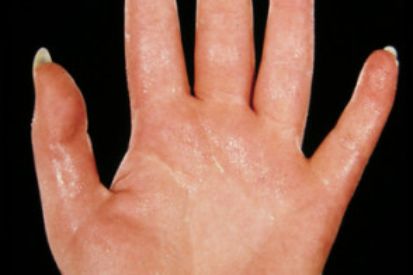 Sweating is a natural skin function essential for maintaining body temperature, but when does it cross the line into hyperhidrosis, a condition marked by excessive sweating? This article will delve into the science of sweat, distinguishing between typical perspiration and the often-debilitating symptoms of hyperhidrosis. We'll explore common causes, diagnosis procedures, and effective treatments that can restore your skin's elasticity and comfort. For those struggling with this condition, understanding your options is the first step to relief. If you're ready to take control of excessive sweating, schedule an appointment with us at Tru Skin Dermatology and discover how we can help.
Sweating is a natural skin function essential for maintaining body temperature, but when does it cross the line into hyperhidrosis, a condition marked by excessive sweating? This article will delve into the science of sweat, distinguishing between typical perspiration and the often-debilitating symptoms of hyperhidrosis. We'll explore common causes, diagnosis procedures, and effective treatments that can restore your skin's elasticity and comfort. For those struggling with this condition, understanding your options is the first step to relief. If you're ready to take control of excessive sweating, schedule an appointment with us at Tru Skin Dermatology and discover how we can help.
The Science Behind Sweating: Normal vs. Excessive
Understanding the mechanics of sweat glands is essential in distinguishing between normal perspiration and hyperhidrosis. We recognize that while sweating is a natural response to heat or stress, excessive sweating can be a concern. Our expertise in skin care, including the use of vitamin C and gentle cleansers, informs our approach to managing moisture levels. We will explore the triggers of excessive sweating and offer insights into maintaining skin health.
How Sweat Glands Function
In our dermatology practice, we often educate patients on the role of sweat glands in maintaining health. These glands, found throughout the skin, are pivotal in regulating body temperature and expelling toxins. When the body heats up, the nervous system triggers these glands to release moisture, which cools the skin as it evaporates. However, in some individuals, this system can become overactive, leading to conditions like hyperhidrosis, which may require specialized therapy or medication.
Understanding the distinction between normal sweating and a potential disease state is crucial for our patients' well-being. We've seen that while everyone sweats during physical exertion or in response to stress, those with hyperhidrosis experience it to a much greater degree, often without a clear trigger. This excessive sweating can disrupt daily activities and cause significant distress, highlighting the importance of seeking dermatological advice for potential treatment options.
Difference Between Normal Perspiration and Hyperhidrosis
At Tru Skin Dermatology, we understand that distinguishing between normal perspiration and hyperhidrosis is vital for our patients. Normal sweating is a response to physical activity, high temperatures, or stress, and can typically be managed with regular hygiene and deodorant. In contrast, hyperhidrosis is characterized by excessive sweating that surpasses the body's need for temperature regulation and often does not respond to standard deodorants. This condition can affect specific areas densely populated with sweat glands, such as the underarms, palms, and soles of the feet.
Our experience has shown that hyperhidrosis can significantly impact quality of life, leading individuals to seek out advanced treatments. Options range from topical solutions to botulinum toxin injections, which temporarily block the nerves that stimulate sweat glands. In severe cases, surgery may be considered to remove or disconnect the sweat glands. To guide our patients through these choices, we provide a comprehensive evaluation:
- Assessment of sweating patterns and triggers
- Evaluation of the impact on daily activities
- Discussion of medical history and previous treatments
- Personalized treatment planning, including non-invasive and surgical options
Our goal is to empower patients with the knowledge and treatments necessary to manage their symptoms effectively, ensuring they can lead comfortable and confident lives.
Hyperhidrosis is characterized by excessive sweating that surpasses the body's need for temperature regulation and often does not respond to standard deodorants.
Triggers of Excessive Sweating
Excessive sweating, or hyperhidrosis, can be triggered by a variety of factors, some of which may surprise our patients. Certain medications, for instance, list hyperhidrosis as a potential side effect, which can be distressing for those unaware of this possibility. Additionally, medical conditions such as diabetes or thyroid issues can also lead to increased sweating. We at Tru Skin Dermatology take a thorough approach to understanding each patient's unique situation, considering all possible triggers to tailor an effective treatment plan.
Advanced treatments, such as laser therapies and endoscopic thoracic sympathectomy, are sometimes recommended for patients with severe hyperhidrosis. These procedures are designed to target overactive sweat glands or interrupt the nerve signals that cause excessive sweating. Moreover, we explore the use of hyaluronic acid in topical formulations to help manage skin hydration and health in affected areas. Our patients' comfort and well-being are our top priorities, and we strive to provide solutions that restore their quality of life:
- Comprehensive evaluation of medication side effects
- Assessment of underlying medical conditions
- Personalized treatment plans with advanced options
- Supportive care with skin health products
Identifying Symptoms of Hyperhidrosis
We often encounter patients who are uncertain if their sweating is normal or indicative of hyperhidrosis. Key symptoms of this condition include excessive sweating that occurs even without physical exertion or high temperatures, often accompanied by anxiety due to the social and professional implications. It's crucial to recognize these signs early, as they can significantly affect an individual's quality of life.
In our practice, we've observed that hyperhidrosis can manifest in localized areas such as the palms, soles, and underarms, where sweat may soak through clothing or drip excessively. This level of perspiration is beyond the body's requirements for cooling and is not typically alleviated by over-the-counter antiperspirants. Patients with these symptoms may benefit from a consultation to explore targeted treatments.
Our approach includes discussing the efficacy of various treatments, such as glycopyrronium bromide, which has shown promise in managing symptoms by inhibiting sweat gland activation. As dermatologists, we are committed to providing evidence-based solutions that can offer relief and improve daily functioning for those affected by hyperhidrosis.
Additionally, we consider the role of antioxidants in skin health, particularly for patients with hyperhidrosis, who may experience skin irritation due to constant moisture. By incorporating antioxidant-rich products into their skincare routine, patients can protect their skin from oxidative stress, potentially reducing discomfort and improving the condition of their skin over time.
Common Causes and Risk Factors
One common cause of hyperhidrosis is an overactivity of the nerves responsible for signaling the sweat glands. When these nerves become overstimulated, they prompt the glands to produce more sweat than necessary, even in the absence of heat or physical exertion. This nerve-related cause is why treatments often focus on nerve-blocking agents.
Another factor contributing to excessive sweating is the use of certain substances, such as aluminium chloride in strong antiperspirants. While designed to control sweating and body odor, for some individuals, these products can irritate the skin and potentially worsen hyperhidrosis symptoms, leading us to recommend alternatives.
Genetics also play a role in hyperhidrosis, with many patients reporting a family history of the condition. This genetic predisposition can affect the body's collagen structure, which is integral to the skin's framework and may influence the function of sweat glands, thereby affecting perspiration levels.
Lastly, environmental factors, including exposure to high temperatures, can exacerbate sweating. We advise patients to use sunscreen to protect their skin, but it's important to choose products that won't clog pores, as blocked sweat ducts can contribute to increased body odor and discomfort associated with hyperhidrosis.
Diagnosing Hyperhidrosis: What to Expect
When we suspect hyperhidrosis in a patient, we initiate a thorough diagnostic process to differentiate it from normal sweating. This often begins with a physical examination and a detailed discussion about the patient's sweating patterns, including any potential triggers such as toxin exposure or infection. We aim to identify the underlying causes of excessive sweating, which can range from genetic factors to chronic conditions like diabetes.
Our diagnostic approach may include specific tests such as the starch-iodine test, which helps visualize the areas of excessive sweating. We also consider the possibility of iontophoresis, a treatment that uses electrical currents to temporarily disable sweat glands, as both a diagnostic tool and a therapeutic option. This non-invasive procedure can provide relief for patients with severe symptoms and help us understand the extent of their condition.
In some cases, we explore whether an anticholinergic medication could be beneficial. These drugs can reduce sweating by blocking the neurotransmitters that stimulate the sweat glands. However, before prescribing any anticholinergic treatment, we carefully evaluate the patient's medical history and current medications to prevent adverse interactions and ensure the best possible outcome.
Finally, we assess the patient's lifestyle and any associated conditions, such as diabetes, that could contribute to their symptoms. By understanding the full scope of the patient's health and environmental factors, we can tailor a treatment plan that addresses their specific needs and improves their quality of life. Our professional commitment is to provide a clear diagnosis and effective solutions for those dealing with hyperhidrosis.
Effective Treatment Options for Hyperhidrosis
For those struggling with hyperhidrosis, we prioritize treatments that aim to improve quality of life by targeting overactive sweat glands. One such option is iontophoresis, a procedure that uses mild electrical currents to reduce gland activity without causing pain.
When conservative measures are insufficient, we may recommend a sympathectomy. This surgical intervention disrupts the nerve signals to sweat glands, offering a long-term solution for severe cases:
- Pre-operative evaluation to ensure suitability for surgery
- Minimally invasive techniques to reduce recovery time
- Post-operative care to monitor and manage any discomfort
Topical treatments containing glycopyrronium bromide or hyaluronic acid can also be effective in managing symptoms. These substances work by creating a barrier on the skin's surface or by modulating the acid mantle, which can help to control excessive sweating.
Ultimately, our goal is to provide a range of options that cater to the individual needs of our patients. We understand that each case of hyperhidrosis is unique, and we are committed to finding the most effective, personalized treatment plan to alleviate the burden of this condition.
Lifestyle Tips to Manage Excessive Sweating
Managing excessive sweating begins with understanding the role of the eccrine sweat gland, which is responsible for most of the body's perspiration. To reduce the activity of these glands, we recommend using antiperspirants containing aluminium, which can temporarily block the sweat ducts and provide relief.
Incorporating vitamin E into your skincare routine can also support skin health, as it helps to nourish the skin and maintain its natural barrier. This is particularly beneficial for those with hyperhidrosis, as it can mitigate irritation caused by constant moisture and friction.
Staying hydrated is crucial; it helps maintain blood volume and allows the body to regulate temperature more effectively. We advise our patients to drink plenty of water throughout the day, which can, in turn, reduce the need for the body to cool itself through excessive sweating.
For those considering treatment for hyperhidrosis, it's important to consult with your insurance provider to understand coverage options. Treatments can vary in cost, and having a clear understanding of what is included in your policy can help in making informed decisions about your care:
| Treatment | Effectiveness | Insurance Coverage |
| Aluminum-based antiperspirants | High for mild cases | Usually not required |
| Prescription medications | Varies | Often covered |
| Surgical options | High for severe cases | Dependent on policy |
| Vitamin E supplementation | Supportive care | Typically not covered |
How Tru Skin Can Help With Hyperhidrosis
At Tru Skin Dermatology, we understand that hyperhidrosis can be a source of stress and discomfort, often mistaken for normal sweating. Our team specializes in identifying and treating this condition with a focus on minimally invasive procedures that offer relief without significant downtime. We consider all factors, including the potential impact of antidepressants on sweat production, to provide a holistic approach to your care.
For those experiencing skin irritation or dermatitis as a result of excessive sweating, we offer targeted treatments that soothe and protect the skin. Our expertise extends to understanding how hyperhidrosis can affect the scalp and hair, ensuring that our treatment plans address all aspects of the condition. We aim to restore not only your comfort but also your confidence.
Our approach includes the latest advancements in dermatology, ensuring that each patient receives the most effective care for their hyperhidrosis. We offer a range of options, from prescription antiperspirants to botulinum toxin injections, all tailored to your unique needs:
| Treatment | Description | Benefit |
| Prescription antiperspirants | Topical applications with higher concentrations of active ingredients | Reduces surface sweating |
| Botulinum Toxin Injections | Minimally invasive procedure to temporarily block nerve signals | Alleviates excessive sweating in targeted areas |
| Medication Adjustments | Review and modification of current prescriptions | Addresses medication-induced sweating |
| Dermatological Therapies | Treatments for skin affected by sweat-related dermatitis | Improves skin health and reduces irritation |

Tru-Skin Dermatology Can Help
At Tru Skin, we are dedicated to providing compassionate and effective care for those dealing with hyperhidrosis. We invite you to schedule a consultation with us to explore your treatment options and take the first step towards managing your symptoms with confidence.
Related Blogs
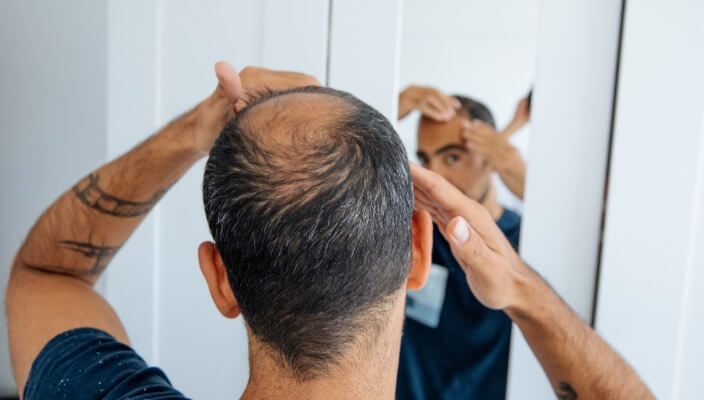
- General Dermatology
Read this blog to learn more about the causes of hair loss and the many treatment options offered at Tru-Skin Dermatology.
Read More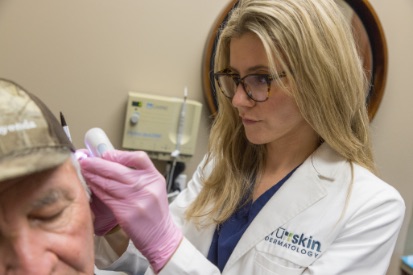
- Skin Cancer
- Skin Exams
- Sun Safety
Ensure early detection of skin cancer. Learn how often to get a full-body skin cancer screening. Stay proactive based on your risk factors.
Read More
- General Dermatology
- Chronic Skin Conditions
Discover hyperhidrosis, its causes, and symptoms. Learn how Tru-Skin Dermatology in Texas can help you manage excessive sweating.
Read MoreFeatured Products
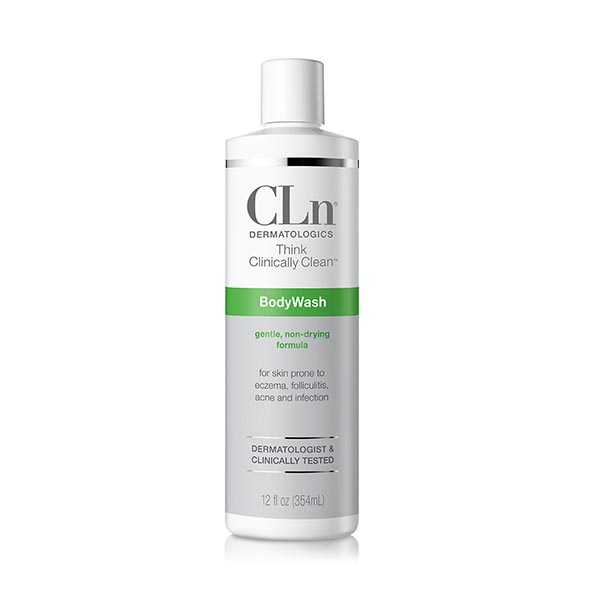
CLn BodyWash
CLn BodyWash is designed for infection- and eczema-prone skin. It is an effective cleanser that is tough on the microbes but gentle on skin. Designed for skin prone to infection, irritation, dermatitis, redness, folliculitis, acne, eczema and compromised skin. 12 fl oz / 354 mL
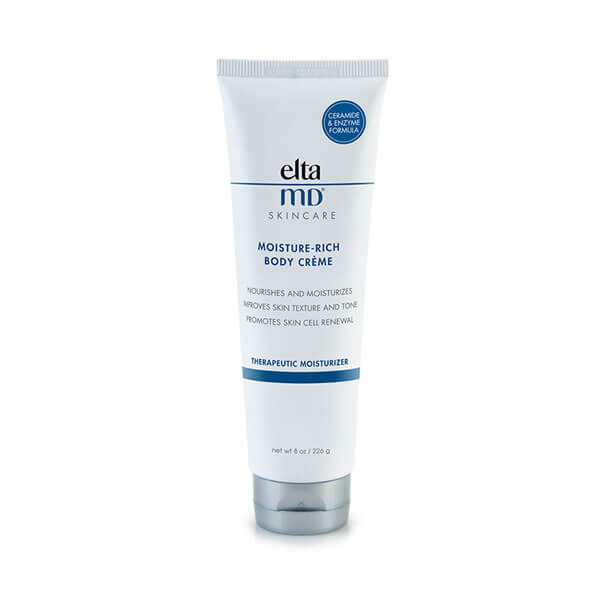
EltaMD Moisture-Rich Body Cream
EltaMD Moisture-Rich Body Crème infuses compromised and dry, flaky, sensitive skin with long-lasting moisture and essential nutrients. It is the ideal daily moisturizer to help achieve and maintain softer, smoother, healthy-looking skin. 8 oz / 226 g



